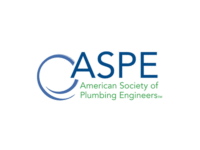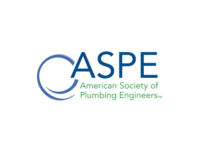In accordance with ASPE’s Procedures for Design Standard Development, ASPE announces the initiation of a project to develop a new standard on critical-care drain, waste and vent (DWV) piping systems.
Over the past 50 years, premise plumbing water systems have been a source of public health outbreaks (e.g., Legionella and Pseudomonas aeruginosa), especially in healthcare settings, but none of the current standards or guidelines, published or under development, address the hazards associated with the transmission of healthcare-acquired infections (HAIs) due to the design and maintenance of the plumbing DWV piping systems, specifically in the critical-care (i.e., intensive care) departments of a healthcare facility. ASPE 82–202x: Plumbing Design Methodology to Reduce the Risk of Hospital-Acquired Infection (HAI) Transmission by Means of Critical Care Drain, Waste, and Vent Piping Systems seeks to close that gap.
Project need
Carbapenem-Resistant Enterobacteriaceae (CRE) and Carbapenem-Producing Carbapenem-Resistant Enterobacteriaceae (CP-CRE) are little known to people outside of the medical and infection prevention (IP) profession, especially the plumbing design engineer. Healthy people usually do not acquire CRE infections, but they are very serious to patients in hospitals and nursing homes. These gram-negative bacteria are resistant to antibiotics. The flushing of fecal matter by certain patients and pouring carbon-sourced liquids into a drainage system are catalysts for the spread of CRE and CP-CRE infections. The bacteria grow and migrate in the drainage and vent pipe from room to room, floor to floor, and are reintroduced into the healthcare environment via floor drains, sinks, showers, water closets, and more. Plumbing engineers can help minimize one of the main infection transmission highways by redesigning DWV piping systems in critical-care departments within these buildings.
For more information on this proposed new standard, contact ASPE’s Director of Communications and Publications, Gretchen Pienta, at gpienta@aspe.org.
A Project Initiation Notification System (PINS) was published in Standards Action on December 23, 2022, with a PINS response end date of January 22, 2023.



